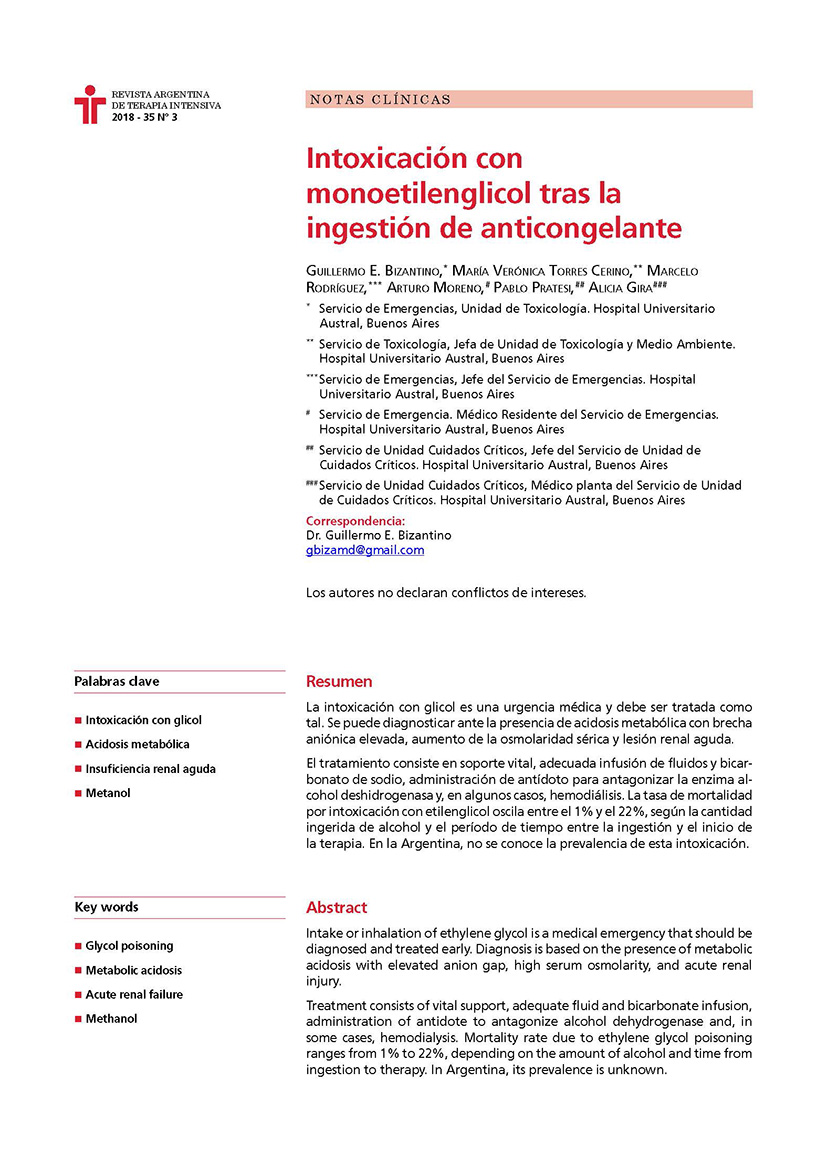Envenenamiento con monoetilenglico tras la ingestión de anticongelante
Main Article Content
Abstract
La intoxicación por glicol es una urgencia médica y debe ser tratada como tal. El diagnóstico puede efectuarse con la existencia de acidosis metabólica con anion GAP elevado, aumento de la osmolaridad sérica, y lesión renal aguda. El tratamiento consiste en soporte vital, adecuada infusión de fluidos y bicarbonato de sodio, administración de antídoto para antagonizar la enzima alcohol deshidrogenasa y, en algunos casos, hemodiálisis. La tasa de mortalidad por intoxicación con etilenglicol oscila entre 1 y 22%, dependiendo de la cantidad de ingestión de alcohol y el período de tiempo entre la ingestión de alcohol y el inicio de la terapia. En Argentina no se conoce la prevalencia de esta intoxicación
Article Details
The magazine does not retain the reproduction rights (copyright) so the authors can republish their works with the sole mention of the original publication source.
References
CONTINUO DEL PASO ANTERIOR:
# Alvarez, Javier; Hospital Universitario Austral, Staff Servicio de Cuidados CrÃticos-
# Bizantino, Guillermo; Hospital Universitario Austral, Fellow Servicio de ToxicologÃa y Medio Ambiente-
# Gira, Alicia; Hospital Universitario Austral, Staff Servicio de Cuidados CrÃticos-
# Herrera, Julieta; Hospital Universitario Austral, Residente Servicio de Cuidados CrÃticos-
# Moreno, Arturo; Hospital Universitario Austral, Residente Servicio de Emergencias-
# Pratesi, Pablo; Hospital Universitario Austral, Jefe Servicio Servicio de Cuidados CrÃticos-
# Rodriguez, Marcelo; Hospital Universitario Austral, Jefe Servicio Servicio de Emergencias-
# Torres Cerino, MarÃa Verónica; Hospital Universitario Austral, Jefe Servicio, Servicio de ToxicologÃa y Medio Ambiente
-----------------------------------------------------------------
(1) Anne F. Eder, Cindy M. McGrath, Yvonne G. Dowdy et al. Ethylene glycol poisoning: toxicokinetic and analytical factors affecting laboratory diagnosis. Clinical Chemistry 44, No. 1, 1998
(2) Tanasescu, Outcome of Patients in Acute Poisoning with Ethylene Glycol – Factors wich may have influence on evolution. J Med and Life, 2014.
(3) McCoy, Severe metanol poisoning. Application of a pharmacokinetic model for etanol therapy and hemodialysis. Am J Med 1979.
(4) Barceloux DG, American Academy of clinical Toxicology Practice Guidelines on the treatment of Ethylene Glycol Poisoning. J Toxicol Clin 2000.
(5) Robert D. Scalley et al. Treatment of Ethylene Glycol Poisoning. Am Fam Physician 2002;66:807-12.
(6) Tanasescu A, Macovei RA, Tudosie MS. Outcome of patients in acute poisoning with ethylene glycol - factors which may have influence on evolution. Journal of Medicine and Life Volume 7, Special Issue 3, 2014
(7) Jeffrey A. Kraut, and Michael E. Mullins. Toxic Alcohols. N Engl J Med

